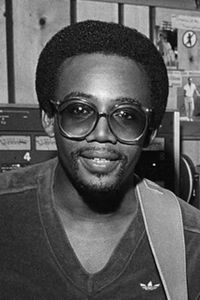Bernard Edwards was a consummate American musician, distinguished by his remarkable versatility and exceptional aptitude as a bassist, vocalist, songwriter, and record producer.
Edwards' bass lines were instrumental in crafting the unmistakable sonic identity of Chic, thereby significantly influencing the character of the late Disco era. Furthermore, his innovative contributions to the evolution of Hip-Hop music are equally impressive, as his iconic bass line from "Good Times" was later sampled by studio musicians for the Sugarhill Gang's groundbreaking debut hit "Rapper's Delight." This landmark track played a pivotal role in cementing the genre's place in popular music culture, thereby solidifying Edwards' status as a trailblazing figure in the development of Hip-Hop.
As the music landscape underwent a transformative shift, Edwards and Rodgers skillfully adapted to the changing tides, redirecting their focus towards music production. Edwards, leveraging his profound expertise, contributed his talents to an impressive array of chart-topping hits, collaborating with a diverse range of renowned artists. This esteemed roster included the iconic Diana Ross, the legendary Sister Sledge, the inimitable Debbie Harry, and the revered Johnny Mathis, among many others.
Noteworthy among Chic's far-reaching influences is the British band Duran Duran, with Edwards playing a pivotal mentorship role to the band's esteemed bassist, John Taylor. Edwards' guidance and expertise undoubtedly left a lasting impact on Taylor's craft.
Moreover, Edwards' impressive musical trajectory continued to unfold with his involvement in the formation of the supergroup The Power Station. This esteemed collective brought together an all-star lineup, featuring John and Andy Taylor from Duran Duran, the inimitable vocalist Robert Palmer, and the talented drummer Tony Thompson.
The Power Station's collaborative efforts yielded a string of significant hits, including the catchy and upbeat "Some Like It Hot" and a memorable cover of the T. Rex classic "Get It On (Bang A Gong)".
The multifaceted talent of Edwards, a renowned producer, was instrumental in shaping the sound of Robert Palmer's solo career, commencing with the groundbreaking album Riptide, a pivotal release that catapulted Palmer to new heights of success.
Tragically, the life of the renowned musician, Edwards, was abruptly and prematurely terminated when he succumbed to his untimely demise in the year 1996, at the tender age of forty-three.
As fate would have it, Edwards had fallen gravely ill during a tour in Japan, his condition rendering him increasingly frail and vulnerable. Despite his precarious state, he had valiantly refused to cancel the upcoming gig, driven by his unwavering dedication to his craft.
During the performance, Edwards momentarily lost consciousness on multiple occasions, his body struggling to cope with the relentless demands placed upon it. Undeterred, he soldiered on, his determination to complete the show a testament to his unshakeable resolve.
Following the concert, Edwards announced his intention to retire to his hotel room, seeking rest and respite from the physical toll the performance had exacted upon him. Unfortunately, his fate was already sealed, and he was discovered lifeless in his hotel room the following day by his musical partner, the esteemed Nile Rodgers.
This devastating loss sent shockwaves throughout the music world, leaving fans and colleagues alike to mourn the passing of a talented artist who had left an indelible mark on the industry.
















